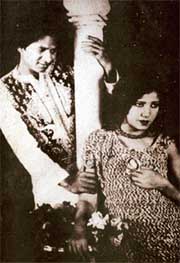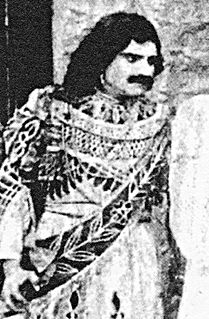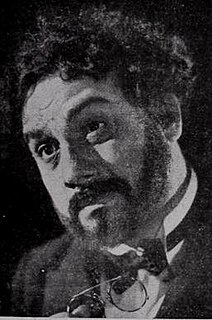Related Research Articles

Fatma Begum (1892–1983) was an Indian actress, director, and screenwriter. She is often considered the first female film director of Indian cinema. Within four years, she went on to write, produce and direct many films. She launched her own production house, Fatma Films, which later became Victoria-Fatma Films, and directed her first film, Bulbul-e-Paristan, in 1926. She lived from 1892-1983 and was mother to three children.

Zubeida Begum Dhanrajgir was an Indian film actress. She starred in the first Indian talkie movie Alam Ara (1931). Her credits include early hits Devdas (1937), and Sagar Movietone's first talkie, Meri Jaan.
The East India Film Company was an Indian film production company, based in Calcutta, Bengal Presidency, British India. It was the first Indian film company to screen a movie at an international film festival. Started in 1932 in Calcutta, by R. L. Khemka, it went on to be a pioneer in producing films across several regional film industries, including Bengali, Hindi, Urdu, Telugu, and Tamil, in the decade after its founding; till then, production companies were restricted regionally.

Gohar Khayyam Mamajiwala, also known as Miss Gohar, was an Indian singer, actress, producer and studio owner.

Master Vithal or Vithal was an actor in Indian cinema, best known as the hero of India's first talkie Alam Ara (1931) and of Marathi and Hindi silent stunt films, which gave him the epithet as the Douglas Fairbanks of India.

Kanjibhai Rathod was an Indian film director.

Yakub Mehboob Khan, known as Yakub, was an Indian Hindi film actor born into a Pathan family in 1904 in Jabalpur, Madhya Pradesh, India. He died in 1958 after a career spanning thirty years in the film industry. He is best known for his comedic villainous roles. He commenced his career as an extra, but soon did roles as a hero and later as a villain. He became one of the most renowned screen villains, while achieving equal success in comedy and character roles. Yakub appeared in over 100 films.
Kulin Kanta is Indian cinema's 1925 crime thriller silent film directed by Homi Master. Based on a true incident the Bawla murder case, Kulin Kanta featured the story of the Maharaja Holkar of Indore and a dancing girl who wanted to escape from the harem. The film starred the "macho hero" Khalil cited as Indian cinema's "first ever star" in the role of the "lecherous Maharaja". The director of photography was G. K. Gokhale, with story written by Mohanlal G. Dave.
Draupadi is a 1931 sound film from Indian cinema. The film was a big-budget mythological production from Ardeshir Irani's Imperial Film Company following their release of the first talkie in India, Alam Ara (1931). It was directed by Bhagwati Prasad Mishra, who had made a name for himself as a photographer and painter and had worked with Irani in his Star, Majestic, Royal and Imperial Studios. The story adaptation from Vyasa's Mahabharata and the screenplay, were by Mishra. The star cast included Prithviraj Kapoor who played the role of Arjuna, with Ermeline as Draupadi, and Khalil as Krishna. The rest of cast included Hadi, Elizer, Rustom Irani and Jilloobai. The cinematographer was Adi Irani.

Homi Master (?–1949) was an actor-director of early Indian cinema. His work extended from the silent era to the talkie era and up to his death. He produced his best films for Kohinoor Film Company and he has been referred to as "silent cinema's most successful film-maker".

Bibbo was a music composer, singer and film actress who worked in both Indian and Pakistani films. She composed music for Adl-e-Jahangir in 1934, leading her to become the first female music composer of the Bollywood. She acted in Indian cinema from 1933 to 1947 before moving to Pakistan, following Partition of India in 1947. She started her acting career with Ajanta Cinetone Ltd. in 1933, working with directors like M. D. Bhavnani and A. P. Kapoor. She was one of the top leading ladies of the 1930s along with actresses like Devika Rani, Durga Khote, Sulochana, Mehtab, Shanta Apte, Sabita Devi, Leela Desai and Naseem Banu. She was referred to as "one of the most important female stars of the 1930s and 1940s". Her fame had her featured in the lyrics of a popular song from the film Gharib Ke Lal (1939) sung by Mirza Musharraf and Kamla Karnataki, with music by Sagheer Asif and lyrics by Rafi Kashmiri. "Tujhe Bibbo Kahoon Ke Sulochana", where Sulochana referred to another popular actress of the time. This was the first time a song featuring famous actors was used in the lyrics of a film song.

Sagar Movietone also Sagar Films, Sagar Film Company and Sagar Productions was an Indian film production company involved in the making of films for Indian cinema. It was launched by Ardeshir Irani with Chimanlal Desai and Dr. Ambalal Patel in 1929 in Bombay, Maharashtra, India. Sagar was initially started as a branch company of Ardeshir's Imperial Film Company. Several key figures from Imperial, such as Mehboob Khan were shifted to Sagar. The studio was in operation from 1930 to 1939. In 1940, it combined with General Pictures to form National Studios. It made "Parsi theatre based films, mythologicals and stunt movies". Sagar fostered the career of many artists who rose to prominence. Early directors such as Prafulla Ghosh, Sarvottam Badami, Ezra Mir and Nanubhai Vakil were promoted by the company. Mehboob Khan got his first break as a director in Al Hilal in 1935. He was referred to as "the most important alumnus" from Sagar, who went on to become one of Indian cinema's "most influential film-makers".

Munawar Sultana (1924–2007), also written as Munawwar Sultana, was an Indian cinema actress, who acted in Hindi/Hindustani films. She is cited as one of the "popular" actresses of the late 1940s to early 1950s period, along with Noor Jehan, Swarnalata and Ragini. Her specialty was playing a selfless woman, enduring the rough treatment meted by her husband and family, but who eventually "brought her erring husband back home".

Mazhar Khan (1905–1950) was an actor-producer-director in Indian Cinema. He was acknowledged for his strong yet natural performances, best exemplified by his role in V. Shantaram's classic Padosi (1941), wherein Mazhar, a Muslim, enacted the role of an upper-caste Hindu. He started his career as a police officer, which he left to study law for a short period. Abandoning his studies he came to Bombay and started his career in cinema with the silent film Fatal Garland opposite the top actress of the time, Ermeline. He became a popular actor, gaining success in several silent films. During his stint in silent films he worked with well-established directors like Bhagwati Mishra, Ezra Mir, Moti P. Bhagnani, R. S. Chowdhary, and M. D. Bhavnani. The magazines of those days, circa 1940s, compared Mazhar to Hollywood actors like Paul Muni, Bela Lugosi and Boris Karloff.
References
- 1 2 3 4 Ashok Raj (1 November 2009). "Khalil, The First Star, and Raja Sandow". Hero Vol.1. Hay House, Inc. pp. 38–. ISBN 978-93-81398-02-9 . Retrieved 17 July 2015.
- ↑ Ahmed, Rauf. "Khalil". cineplot.com. Cineplot. Retrieved 24 October 2016.
- ↑ Ashish Rajadhyaksha; Paul Willemen (10 July 2014). "Kohinoor Film Company". Encyclopedia of Indian Cinema. Routledge. p. 126. ISBN 978-1-135-94318-9 . Retrieved 25 October 2016.
- ↑ Phil Hardy (1997). "Indian Crime Films". The BFI Companion to Crime. A&C Black. pp. 180–. ISBN 978-0-304-33215-1 . Retrieved 26 October 2016.
- ↑ "Lanka Ni Laadi". indiancine.ma. indiancine.ma. Retrieved 25 October 2016.
- 1 2 "Khalil-Filmography". cineplot.com. Retrieved 25 October 2016.
- ↑ Abbas, K. A. (February 1940). "Communalists, Keep Out!". Filmindia. 6 (2): 31. Retrieved 12 November 2016.
- ↑ Patel, Baburao (December 1941). "Bombay Calling-Khalil Ahmed". Filmindia. 7 (11): 7. Retrieved 12 November 2016.